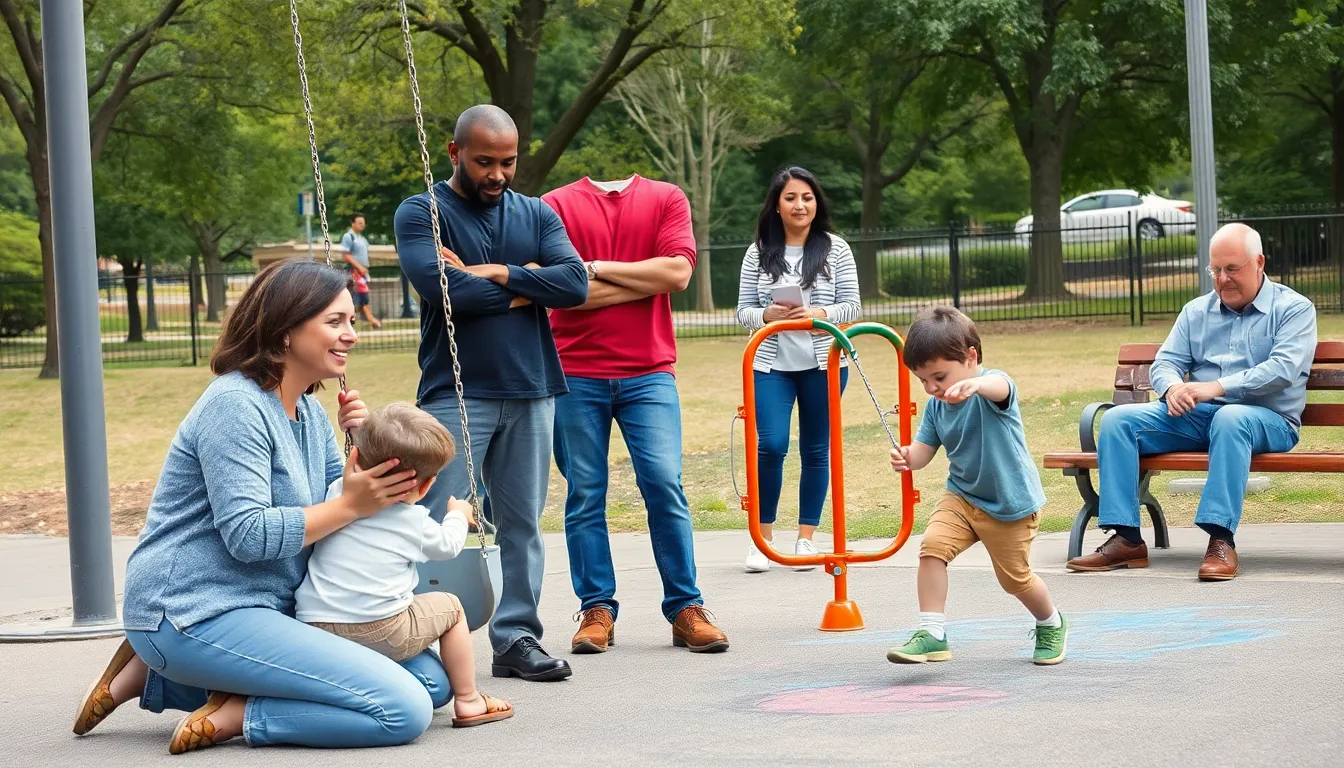Table of Contents
ToggleWhen it comes to raising kids, parents often find themselves navigating a maze of choices. Each child-rearing style offers a different map, but which one leads to the treasure of well-adjusted adults? From the strict disciplinarian to the easygoing friend, every approach has its quirks and merits.
Overview Of Child-Rearing Styles
Child-rearing styles encompass distinct methods that affect children’s emotional and social growth significantly. Authoritative parents, for example, combine warmth with structure, promoting independence through supportive guidance. Permissive parents emphasize freedom and often allow children to self-regulate, which can foster creativity but may lack necessary boundaries.
In contrast, authoritarian parents enforce strict rules and high expectations, focusing on obedience rather than emotional connection. Uninvolved parents tend to provide minimal guidance or emotional support, which can lead to children feeling neglected.
Each style presents unique strengths. Authoritative parenting correlates with positive outcomes, such as higher self-esteem and strong social skills, according to research published in the Journal of Child Development. Meanwhile, permissive styles might lead to higher levels of agility and innovation, though they can sometimes result in challenges with authority figures.
Distinct characteristics also arise from each approach. Authoritative parents typically employ open communication, while authoritarian parents stress discipline at the expense of dialogue. Permissive parents offer emotional responsiveness, often avoiding conflict, whereas uninvolved parents may struggle to meet their children’s developmental needs.
Statistical data support these observations. Studies show that children raised by authoritative parents tend to perform better academically. Children from authoritarian backgrounds often face social difficulties, and those with permissive or uninvolved parents frequently exhibit a lack of direction. Each approach influences the trajectory of a child’s development. Understanding these styles ultimately aids in fostering healthier environments for children as they grow.
Authoritative Parenting

Authoritative parenting blends warmth with structure. This style encourages independence while providing supportive guidance.
Characteristics
Open communication defines authoritative parents. They set clear expectations, nurturing emotional connections. Balance is key; they impose reasonable boundaries while allowing children freedom. Active listening helps children feel validated. Authoritative parents often demonstrate warmth and responsiveness, creating a secure environment. Problem-solving is encouraged, fostering critical thinking skills in children. Flexibility in rules allows adaptation to individual child needs, promoting a sense of responsibility. Research also shows authoritative parents practice fair discipline, reinforcing trust and respect.
Benefits
Children raised by authoritative parents tend to show higher self-esteem and better social skills. Academic performance often reflects the positive outcomes associated with this parenting style. These children typically navigate peer relationships more effectively and demonstrate resilience in challenging situations. Emotional intelligence thrives in this nurturing environment, aiding conflict resolution. They also respect authority figures, showing adaptability in diverse settings. Studies indicate that these children often possess strong leadership qualities, actively participating in group dynamics. Adaptability and creativity flourish as a result of the balanced approach foundational to authoritative parenting.
Authoritarian Parenting
Authoritarian parenting emphasizes strict rules and high expectations. This style prioritizes obedience, often at the expense of emotional connection.
Characteristics
Authoritarian parents set clear and rigid guidelines. They maintain low levels of warmth and often expect compliance without question. Communication tends to be one-way, rarely encouraging children to express their thoughts. Consequences for disobedience are typically severe, reinforcing fear over understanding. These parents frequently rely on discipline to manage behavior, aiming for conformity rather than individuality. Children face limited autonomy, which may compromise their problem-solving abilities. Research shows that this approach can lead to a lack of empathy in children, impacting their future relationships.
Impact On Child Development
Authoritarian parenting affects children’s social skills and emotional health. Children raised in this environment often struggle with self-esteem issues, as their worth hinges on strict adherence to rules. Fear of failure can inhibit their willingness to take risks or engage with peers. They may develop anxiety or aggression in response to rigid expectations. Long-term studies indicate that individuals from authoritarian backgrounds often experience difficulties in forming healthy relationships. These children may take longer to develop autonomy, impacting career choices and personal development. Overall, authoritarian parenting can hinder emotional intelligence and adaptive social behavior.
Permissive Parenting
Permissive parenting fosters an environment rich in freedom and creativity but often lacks necessary boundaries. This style prioritizes emotional connection over discipline, allowing children significant autonomy in their actions and decisions.
Characteristics
Parents who practice permissive parenting typically avoid strict rules. They often encourage open dialogue and prioritize their child’s emotions. Flexibility defines this approach, as parents are lenient and often grant extensive freedom. Often, children under permissive care face minimal consequences for their actions. This parenting style reflects warmth and affection, promoting a friendly atmosphere that encourages self-expression and exploration.
Long-Term Effects
Long-term effects of permissive parenting can manifest in various ways. Children raised in this environment may struggle with authority figures due to their accustomed freedom. Often, they exhibit higher levels of creativity but may also face challenges with self-discipline and responsibility. Research shows these children might lack essential coping skills, making it difficult to navigate structured environments later in life. Emotional intelligence appears heightened; however, issues related to impulse control can lead to difficulties adjusting to societal norms and expectations.
Uninvolved Parenting
Uninvolved parenting, also known as neglectful parenting, lacks both emotional support and guidance. Parents practicing this style often prioritize their own needs over their children’s, resulting in minimal engagement.
Characteristics
A few distinct traits define uninvolved parenting. Low levels of responsiveness characterize this style; parents frequently display indifference to their child’s emotional needs. They generally avoid communicating expectations, leading to a lack of direction for the child. Parents often maintain minimal supervision, allowing children to navigate daily challenges independently. Flexibility in rules is uncommon, as these parents typically impose few boundaries. Consequently, children may feel neglected and unsupported.
Psychological Consequences
Uninvolved parenting significantly impacts children’s emotional and psychological well-being. Children often experience feelings of abandonment and low self-esteem due to a lack of attention and care. Research indicates that these children may develop poor social skills, leading to difficulties in building relationships. They might also struggle with behavioral issues and mental health challenges, such as anxiety and depression. Long-term effects include difficulties in establishing autonomy and managing emotional regulation, contributing to overall developmental delays.
Child-rearing styles play a pivotal role in shaping children’s emotional and social development. Each approach offers distinct advantages and challenges that can influence a child’s future. Understanding these styles enables parents to make informed decisions that promote healthy growth and well-being.
By recognizing the impact of authoritative, authoritarian, permissive, and uninvolved parenting, caregivers can adapt their methods to foster resilience, independence, and emotional intelligence in their children. Ultimately, the goal is to create nurturing environments that support children’s unique needs, helping them thrive as well-adjusted adults.




